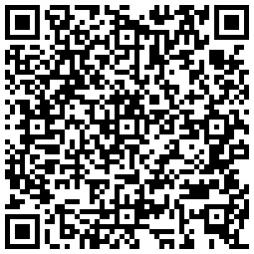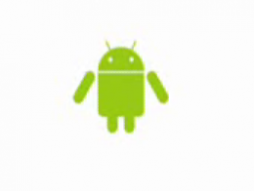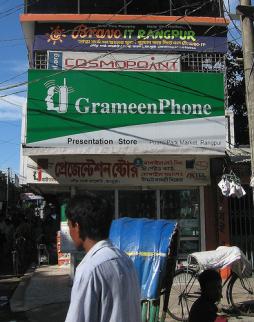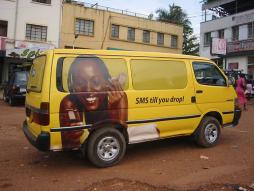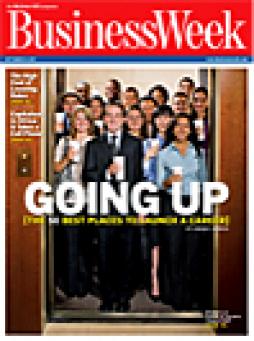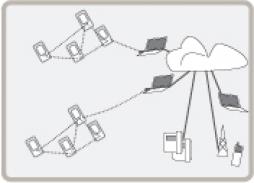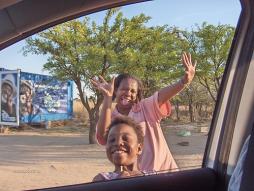Communications Access and Infrastructure
Posted by KatrinVerclas on Dec 05, 2007
I attend an increasing number of keynotes where CEOs and EVPs of both major mobile handset manufacturers and mobile operators trumpet their role in bringing the internet to the bottom of the pyramid in the developing world. It's a total fallacy.
Posted by CorinneRamey on Dec 05, 2007
Did you know that you can dial up the Burmese government for free from your mobile phone? A new program called Call for Change allows users to call Burma and other humanitarian causes at no cost beyond what their mobile provider charges for a local call.
Call for Change is a program of Rebtel, a Stockholm-based company that provides low-cost and free ways to make calls on a mobile phone. The service works currently works in 40 countries and 50 U.S. cities.
Call for Change started about a month ago during the protests in Burma. Rebtel's staffers felt passionately about the Burmese protests, and were frustrated when Burma suddently disappeared from the nightly news. Greg Spector, one of Rebtel's founders, wrote on Rebtel's blog:
Posted by CorinneRamey on Nov 30, 2007
QR codes have been in the news recently, bringing news stories, animated zoo animals, and nurtrition facts from tiny barcodes to the screens of mobile phones worldwide. By linking print media with mobile phones, the codes are helping to bridge the connection between old and new media and have impliations for social mobile campaigns.
A QR -- or Quick Response -- code is a two dimensional bar code that can be used for tracking or link to information such as a website or text message. When a user scans the code with a camera phone the code then links to the destination URL or other information. The codes were first created by a Japanese corporation in 1994 for tracking parts used in car manufacturing, but today are found in everything from newspapers to business cards to advertisements. QR codes can hold several hundred times more information than conventional bar codes.
Posted by CorinneRamey on Nov 17, 2007
MobileActive07 is quickly approaching, and as we get ready, we bring you a series of sneak peaks of some of the interesting people, projects, and technologies that will be at the conference.
Brenda Burrell, who will be joining us from Zimbabwe, is one of founders of Kubatana.net. Brenda sat down with MobileActive for a discussion about her work using mobiles as an alternative media source in Kubatana and Dialup Radio.
Posted by KatrinVerclas on Nov 05, 2007
Google announced today Android and of the Open Handset Alliance, throwing wide open the field of mobile applications for commercial and social and civic causes and potentially much cheaper handsets that are especially important in developing countries. We here at MobileActive.org think that this will spur developments for the social sector that are faster and cheaper -- an "Android for Good."
The Open Handset Alliance is a consortium of more than 30 tech and mobile companies and Android is its open platform. Google's support of the project and development of the new mobile app software stack that includes an operating system, moddleware and open applications development is significant and seen as a major competitor to other mobile platform providers such as Microsoft, RIM, and Symbian.
Posted by CorinneRamey on Oct 08, 2007
Abu Sufian's small room in Fultola, Bangladesh looks like a standard Internet cafe. There are four workstations -- each with a mouse, keyboard, and monitor -- where customers can check email or browse the Internet. But this isn't just any Internet cafe -- the center is all made possible by one mobile phone.
According to this article from Telecentre.org, this "Community Information Center" only has one computer, which acts as a server for the other workstations. Internet access is provided by the EDGE-enabled (Enhanced Data Rates for GSM Evolution) mobile phone. From the article:
Posted by CorinneRamey on Sep 28, 2007
The rural mobile market is growing, and carriers are working to meet the unique demands and challenges of this sector of the population. Even in the poorest countries -- like Sierra Leone, which ranks 176 out of 177 countries on the UN's 2006 Human Development Index -- mobile phones have become a growing necessity, creating a unique set of cultural norms and practices. According to a recent article in Africa News, "It is no secret that Sierra Leone has one of the largest mobile network services although said to be the least developed country in the West African Sub-Region." Mobile service in Sierra Leone is covered by three carriers -- Mobitel, Celtel and Millicom. Although the network has increased dramatically since the civil war ended in 2000, there is still demand from rural customers for more comprehensive coverage in poor rural areas.
Posted by CorinneRamey on Sep 28, 2007
Mobile use and prevalence is exploding throughout the developing world. As Tim Kelly writes in id21 insights's September newsletter, in 1990 there were only 14,200 mobiles in Africa, which by, 2005, grew to a total of 137 million. Id21 predicts that the majority of the world's poor will have mobile access within the next generation. This number continues to increase, showing just how important mobile phones have become in development.
In our ongoing series on mobiles in development -- m4dev, as we are calling it, we are pleased to see that id21 focuses its current newsletter on mobiles used in development, with articles profiling mobiles used in countries including Nigeria, Bangladesh, Jamaica, and Zambia.
Posted by KatrinVerclas on Sep 18, 2007
We are starting a series of articles on mobile phones in economic development this week and to kick it off, Business Week in its current issue published a few interesting summaries of the state of affairs in mobiles in economic development. This apparently just to make it easy for us to get MobileActives around the world up to speed!
Upwardly Mobile in Africa describes farmers in Kenya using mobiles to bring their products to market and mobile payments using the Keyan mobile payment system M-Pesa. The article describes Grameen Foundation's Village Phone Program that we will be featuring in our next article that is expanding into Uganda in collaboration with the local carrier MTN where there are now 13,000 Village Phone Operators renting out a mobile phone with the help of microcredit and discounted airtime.
Posted by KatrinVerclas on Sep 12, 2007
MobileActive friend and colleague Anders Carlius runs Terranet, an innovative company providing mobile peer-to-peer technology. Anders is a former businessman from Sweden who decided he wanted to do good in the world with a new venture after a career in telecommunications. His company is after an emerging market in developing countries with either a rural or densely populated market (such as a refugee camp, for exaple).
The technology is simple: Terranet outfits a special Erricson phone with peer-to-peer wireless networking ability. In its pure form, there is no need for base stations, antenna installations or infrastructure. With this phone, a user can call and text anyone at no cost within two kilometers, or up to 20 kilometres in a mesh network. Through TerraNet wireless Internet access point, the phone turns into a normal wireless communication device.
From Terranet's prospectus:
Posted by KatrinVerclas on Jul 23, 2007
Technology that has been taken for granted by people in wealthy countries is making life easier and safer for many poor in developing countries.
The rapid spread of cellular telephones in many African countries has been a remarkable and unexpected phenomenon particularly when one considers the high levels of poverty and social turmoil that occurs in many of these countries. Last year the Enterprise Africa! team visited Botswana in order to document the poverty alleviating aspects of the cellular telephone. Technology that has long been taken for granted by people in wealthy countries is making life easier, safer, and more prosperous for many, including the poor in developing countries. A result of the rapid diffusion of this technology is the creation of a vast number of jobs and enterprises, enabling many Africans to escape the poverty trap.
The most obvious benefit of cellular telephones is that they provide access to communication where none existed before. Families in remote areas, and farmers and businesses that could not afford or even obtain fixed lines, are now able to talk with loved ones, receive orders, schedule deliveries, and make appointments. Mobile phones were an immediate success, even in areas that already had access to landlines, because in addition to connectivity they offered services like itemised billing, prepaid or contract options, and other value-added services.
Posted by on Jan 01, 1970
n/a
Posted by on Jan 01, 1970
n/a
Posted by on Jan 01, 1970
n/a
Posted by on Jan 01, 1970
n/a

